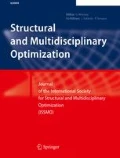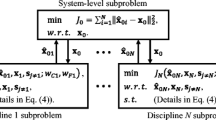Abstract
Collaborative optimization (CO) is a decomposition-based multidisciplinary design optimization method that sometimes suffers from two predominant drawbacks: computational inefficiency and nonexistence of Lagrange multipliers when the system-level optimization solution is system-level feasible. To overcome aforementioned drawbacks, we propose enhanced design space decrease collaborative optimization (EDSDCO). It can notably simplify the system-level optimization problem through modifying the system-level consistency equality constraints that exist in the standard CO to create some linear inequality constraints with no tolerance. Thus, the aforementioned drawbacks, mainly resulted by the use of equality forms of consistency constraints, can be successfully overcome. During the process of optimization, the updated system-level solution space is constantly decreased; meanwhile, the original feasible region is entirely preserved throughout regardless of whether the constraints are convex. Consequently, the global optimum can be obtained when the system-level optimization solution moves into the original feasible region. In EDSDCO, the starting point is not introduced to the formulas of subsystem or system-level optimization. Therefore, the optimum obtained using EDSDCO cannot be affected by the parameters of the starting points, which certainly enhances EDSDCO’s robustness. EDSDCO converges faster than design space decrease collaborative optimization for two reasons: deleting more original infeasible region fragments per iteration and more efficient decision to choose the next solution subspace. In order to illustrate the proposed method’s capabilities, we describe the principles and process of EDSDCO and discuss its application to three optimization problems: a numerical test problem, gear reducer design problem, and combustion of propane problem.














Similar content being viewed by others
References
Alexandrov NM, Lewis RM (1999) Comparative properties of collaborative optimization and other approaches to MDO. Technical Report ICASE Report. NASA/CR-1999-209354
Alexandrov NM, Lewis RM (2002) Analytical and computational aspects of collaborative optimization for multidisciplinary design. AIAA J 40(2):301–309
Braun RD (1996) Collaborative optimization: an architecture for large-scale destributed design. Dissertation, Stanford University
Cormier T, Scott A, Ledsinger L et al. (2000) Comparison of collaborative optimization to conventional design techniques for a conceptual rlv. 8th AIAA/ USAF/NASA/ISSMO Symposium on Multidisciplinary Analysis and Optimization, Long Beach, California. AIAA–2000 –4885
Demiguel A, Murray W (2000) An analysis of collaborative optimization methods. 8th AIAA/USAF/ NASA/ISSMO Symposium on Multidisciplinary Analysis and Optimization, Long Beach, CA. AIAA– 2000– 4720
Gou P (2009) Application of sequential collaborative optimization in the structural system design of deep sea space station. Dissertation, Shanghai Jiao Tong University
Huque Z, Jahingir N (2002) Application of collaborative optimization on a RBCC inlet/ejector system. 38th AIAA/ASME/SAE/ASEE Joint Propulsion Conference & Exhibi, Indianapolis, Indiana. AIAA 2002-3604
Jin X, Duan FH, Xin DZ, Mu G (2015) Novel multidisciplinary collaborative optimization method base on design space decrease. J Mech Eng 51(11):133–141
Kroo I, Altus S, Braun R, Gage P, Sobieski I (1994) Multidisciplinary optimization methods for aircraft preliminary design. AIAA- 94-4325-cp: 697-707
Lee CH, Mavris ND (2012) Bayesian collaborative sampling for aero-propulsion design of an engine and nacelle. 48th AIAA/ASME/SAE/ASEE Joint Propulsion Conference & Exhibit, Atlanta, Georgia. AIAA -2012-3997
Li X, Liu CA, Li WJ, Long T (2011) An alternative formulation of collaborative optimization base on geometric analysis. J Mech Des 133(5):051005
Lin JG (2004) Analysis and enhancement of collaborative optimization for multidisciplinary design. AIAA J 42(2):348–360
Padula SL, Alexandrov N, Green LL (1996) MDO Test suite at NASA Langley research center. AIAA Meeting Papers on Disc: 410-420
Park H, Chung J, Behdinan K et al. (2011) Reliability and possibility based multidisciplinary design optimization for aircraft conceptual design. 11th AIAA Aviation Technology, Integration, and Operations (ATIO) Conference, Virginia Beach, VA. AIAA 2011-6960
Roth BD, Kroo IM (2008) Enhanced collaborative optimization: a decomposition-based method for multidisciplinary design. Proceedings of the ASME International Design Engineering Technical Conferences & Computers and Information in Engineering Conference Brooklyn, New York, USA. DETC2008-50038
Sobieski IP, Kroo IM (2000) Collaborative optimization using response surface estimation. AIAA J 38(10):1931–1938
Tedford NP, Martins JRRA (2010) Benchmarking multidisciplinary design algorithms. Optim Eng (2010) 11:159–183
Xu L (2009) Research and application of aerospace vehicle MDO process and related technology. Dissertation, National University of Defense Technology
Yi SI, Shin JK, Park GJ (2008) Comparison of MDO methods with mathematical examples. Struct Multidiscip Optim 35(5):391–402
Zhang ZQ, He LS (2011) Multidisciplinary design collaborative optimization for common aero vehicle. J Beijing Univ Aeronaut Astronaut 37(4):478–482
Acknowledgments
This work is supported by National Natural Science Foundation of China (Grant No. 51275068) and Aeronautical Science Foundation of China (Grant No. 20130863006, 20150863003).
Author information
Authors and Affiliations
Corresponding author
Rights and permissions
About this article
Cite this article
Jin, X., Duan, F., Chen, P. et al. A robust global optimization approach to solving CO problems – enhanced design space decrease collaborative optimization. Struct Multidisc Optim 55, 2305–2322 (2017). https://doi.org/10.1007/s00158-016-1644-6
Received:
Revised:
Accepted:
Published:
Issue Date:
DOI: https://doi.org/10.1007/s00158-016-1644-6




